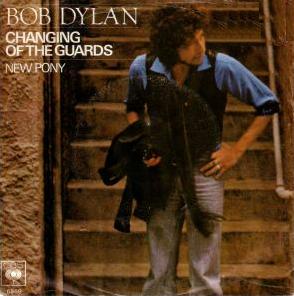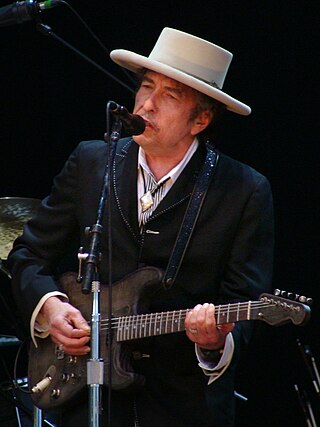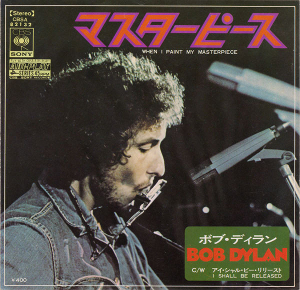Related Research Articles

Oliver Wakeman is an English musician, rock keyboardist and composer. He was a member of Yes from 2008 to 2011, filling the role of keyboardist previously held by his father, Rick Wakeman.

Slow Train Coming is the nineteenth studio album by American singer-songwriter Bob Dylan, released on August 20, 1979, by Columbia Records. It was Dylan's first album following his conversion to Christianity, and the songs either express personal faith, or stress the importance of Christian teachings and philosophy. The evangelical nature of the record alienated many of Dylan's existing fans; at the same time, many Christians were drawn into his fan base. Slow Train Coming was listed at No. 16 in the 2001 book CCM Presents: The 100 Greatest Albums in Christian Music.
"Long Black Veil" is a 1959 country ballad, written by Danny Dill and Marijohn Wilkin and originally recorded by Lefty Frizzell.

Lord Richard Buckley was an American stand-up comedian and recording artist, who in the 1940s and 1950s created a character that was, according to The New York Times, "an unlikely persona ... part English royalty, part Dizzy Gillespie."

Live at The Gaslight 1962 is a live album including ten songs from early Bob Dylan performances recorded in October 1962 at The Gaslight Cafe in New York City's Greenwich Village. Released in 2005 by Columbia Records, it was originally distributed through an exclusive 18-month deal with Starbucks, after which it was released to the general retail market. The album release coincided with the release of the documentary No Direction Home: Bob Dylan.

"Quinn the Eskimo (The Mighty Quinn)" is a folk-rock song written and first recorded by Bob Dylan in 1967 during the Basement Tapes sessions. The song's first release was in January 1968 as "Mighty Quinn" in a version by the British band Manfred Mann, which became a great success. It has been recorded by a number of performers, often under the "Mighty Quinn" title.

"Just Like Tom Thumb's Blues" is a song written and performed by Bob Dylan. It was originally recorded on August 2, 1965, and released on the album Highway 61 Revisited. The song was later released on the compilation album Bob Dylan's Greatest Hits Vol. II and as two separate live versions recorded at concerts in 1966: the first of which appeared on the B-side of Dylan's "I Want You" single, with the second being released on The Bootleg Series Vol. 4: Bob Dylan Live 1966, The "Royal Albert Hall" Concert. The song has been covered by many artists, including Gordon Lightfoot, Cat Power, Nina Simone, Barry McGuire, Judy Collins, Frankie Miller, Linda Ronstadt, the Grateful Dead, Neil Young, The Black Crowes, Townes Van Zandt, and Bryan Ferry. Lightfoot's version was recorded only weeks after Dylan's original had been released and reached #3 on the Canadian RPM singles chart.
Black cross or Black Cross may refer to:
"Black Crow Blues" is a song written by Bob Dylan, released on his 1964 album Another Side of Bob Dylan.

"Changing of the Guards" is a song written by Bob Dylan, released in 1978 as a single and as the first track on his album Street-Legal. As a single it failed to reach the Billboard Top 100. However, the song has been included on compilation albums: Bob Dylan's Greatest Hits Volume 3, released in 1994, and the Deluxe Edition of Dylan, released in 2007.

Bob Dylan is an American singer-songwriter. Often considered to be one of the greatest songwriters in history, Dylan has been a major figure in popular culture over his 60-year career. He rose to prominence in the 1960s, when his songs "Blowin' in the Wind" (1963) and "The Times They Are a-Changin'" (1964) became anthems for the civil rights and antiwar movements. Initially modeling his style on Woody Guthrie's folk songs, Robert Johnson's blues, and what he called the "architectural forms" of Hank Williams's country songs, Dylan added increasingly sophisticated lyrical techniques to the folk music of the early 1960s, infusing it "with the intellectualism of classic literature and poetry". His lyrics incorporated political, social, and philosophical influences, defying pop music conventions and appealing to the decade's burgeoning counterculture.
Hezekiah was a king of Judah.
"Bob Dylan's Dream" is a song written by Bob Dylan in 1963. It was recorded by Dylan on April 24, 1963, and was released by Columbia Records a month later on the album The Freewheelin' Bob Dylan.

"I Shall Be Released" is a 1967 song written by Bob Dylan.

Great White Wonder, or GWW, is the first notable rock bootleg album, released in July 1969, and containing unofficially released recordings by Bob Dylan. It is also the first release from bootleg record label Trademark of Quality. Seven of the twenty-four tracks presented here were recorded with The Band in the summer of 1967 in West Saugerties, New York, during the informal sessions that were later released in a more complete form in Dylan's 1975 album The Basement Tapes. Much of the other material consists of a recording made in December 1961 in a Minnesota hotel room, studio outtakes from several of Dylan's albums, and a live performance on The Johnny Cash Show. It was the first time that these previously unreleased recordings came to the market; many more would be released in similar formats over the coming years, though most were single albums, not double albums like this record.
"Dink's Song" is an American folk song played by many folk revival musicians such as Pete Seeger, Fred Neil, Bob Dylan and Dave Van Ronk, Kate & Anna McGarrigle, and Cisco Houston as well as more recent musicians like Jeff Buckley. The song tells the story of a woman deserted by her lover when she needs him the most.

Joseph Simon Newman was an American entrepreneur and writer. He was a founder of the Newman-Stern Company, and gained renown as a writer of both light and serious verse.

"Big River" is a song written and originally recorded by Johnny Cash. Released as a single by Sun Records in 1958, it went as high as #4 on the Billboard country music charts and stayed on the charts for 14 weeks.
Bob Dylan bootleg recordings are unreleased performances by American singer-songwriter Bob Dylan, that have been circulated throughout the public without undergoing an official, sanctioned release. It is commonly misconceived that bootlegs are only restricted to audio, but bootleg video performances, such as Dylan's 1966 film Eat the Document, which remains officially unreleased, are considered to be bootlegs. Dylan is generally considered to be the most bootlegged artist in rock history, rivaled only by the Grateful Dead.
Bob Dylan is an American musician, singer-songwriter, music producer, artist, and writer. He has been an influential figure in popular music and culture for more than five decades. Much of his most celebrated work dates from the 1960s when he was an informal chronicler and a seemingly reluctant figurehead of social unrest.
References
- ↑ Newman, Joseph Simon (1948). It Could Be Verse!. World Publishing Co. ASIN B0007EH246 . Retrieved January 20, 2016.
- 1 2 3 "Black Cross". lordbuckley.com. Archived from the original on January 25, 2016. Retrieved January 20, 2016.
- ↑ Lord Buckley –Way Out Humor at Discogs
- ↑ Lord Buckley –Lord Buckley In Concert at Discogs (list of releases)
- ↑ "Black Cross (Hezekiah Jones), (Joseph S. Newman/Richard "Lord" Buckley/Bob Dylan)". bobdylanroots.com. Retrieved January 20, 2016.
- ↑ "Black Cross by Lord Buckley". bobdylan.com. Retrieved January 20, 2016.
- ↑ Bob Dylan –Gaslight Tapes at Discogs (list of releases)